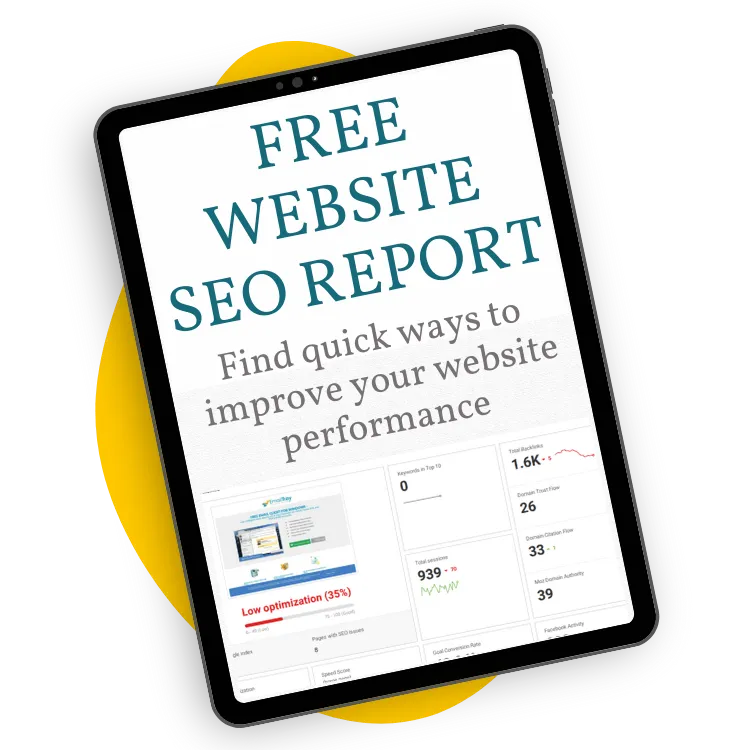Generative Engine Optimization (GEO): The Beginner's Guide To Optimizing For AI Search
By Jules White | Released: July 30th 2024 | reading time: 10 minutes

🎙️Listen to the podcast version of this article🎙️
The world of search is changing, with new AI search engine platforms arriving on the scene every day Generative Engine Optimization (GEO) is the latest marketing acronym that we need to become familiar with!
I know, I know! I hate acronyms too - but don't let the fancy name scare you – I’ll break it down for you to understand how it’s relevant to your business and what you need to do about it!
Most people in the online world know that SEO is important (even if they aren’t quite sure why!) In this article I'll help you understand how to get your website noticed by both people and the AI systems increasingly used to answer questions.
You'll learn how to optimise your content so that AI-powered search engines can easily understand and showcase it, without getting bogged down in technical jargon.
By the end of this guide, you'll be well on your way to boosting your website's visibility and attracting more organic traffic. If you have any questions, feel free to reach out to me here.
Table of Contents
What Exactly is GEO?
Why Should You Care About GEO?
3 Beginner-Friendly Steps to GEO Success
Step 1: Understand Your Audience & Their Questions
Step 2: Structure Your Content for Easy Reading (and AI Understanding)
Step 3: Think Beyond Keywords – Embrace Topical Authority
Key Takeaways: Your GEO Roadmap
What Exactly is GEO? (And Why You Still Need SEO)
You may have listened to my podcast episode on 🎙️SEO Basics - Your Essential Guide to Getting Found Online where I covered the fundamentals of optimising your website to rank higher in traditional search engines like Google.
But, the search landscape is changing faster than ever, thanks to artificial intelligence (AI). Now, we need to start thinking beyond traditional SEO and embrace a new approach: Generative Engine Optimization (GEO).
Can I just skip all that SEO stuff and focus on GEO?
You might be wondering if focusing on GEO rather than SEO is a good plan. The short answer is no (sorry 😉😄).
While GEO is becoming increasingly important, it doesn't replace traditional SEO.
Think of your website like a car. Search Engine Optimization (SEO) is making sure everything is put together properly, the engine works and it can actually drive places. GEO is like the GPS that helps you navigate the evolving search landscape and get to the top of the search results. But even the best GPS won't help if your car doesn't have a working engine.
So, What IS GEO?
In simple terms, GEO is all about making sure your website's content is easy for AI-powered search engines (like ChatGPT, Perplexity & the new Google generative AI Search) to understand and use to provide direct answers.
Think of it as writing for both people and robots.
So what’s the difference?
Traditional SEO: Optimises your content so it appears in a list of search results, like a librarian pointing you to the right shelf in a library.
GEO: Optimises your content so the AI can understand it deeply and provide direct, comprehensive answers, like an encyclopedia giving you the exact information you need.
To make your content "GEO-friendly," you need to write it in a way that these AI "encyclopedias" can easily read and understand.
How GEO is Different from SEO?
SEO (Search Engine Optimisation) helps your web pages appear higher in search engine results.
GEO (Generative Engine Optimization) aims to have your content included directly in answers generated by AI systems.
SEO focuses on using relevant keywords in your content, while GEO focuses on providing clear and concise answers to user questions, with context.
SEO is about optimising individual pages, while GEO is about how AI systems combine information from various sources to provide comprehensive answers.
Why GEO is Gaining Traction?
The rise of GEO is driven by a shift in how people search for information. More and more users are turning to AI-powered tools for quick, accurate answers. This is especially true for complex or nuanced questions that traditional search engines might struggle with.
As a result, businesses that optimise their content for both SEO & GEO stand to gain significant advantages, including:
🔎 Increased Visibility: Getting featured in AI-generated summaries and answers can expose your content to a wider audience.
😀 Enhanced User Experience: AI can deliver more relevant and personalized results to users, improving their overall experience.
💰 Competitive Advantage: By embracing GEO early on, you can position yourself as a leader in your industry and stay ahead of the curve.
GEO is not a replacement for SEO; it's an enhancement.
By combining both approaches, you can ensure your website is visible to both traditional search engines and AI-powered tools, maximizing your reach and impact.
Still with me? Let's dive into the steps that will get your website noticed.
Why Should You Care About GEO?
Now that you understand what GEO is and how it differs from traditional SEO, you might be wondering, "Why should I bother with all this? Is it really worth my time and effort?"
The answer is a resounding YES! Here's why GEO is crucial for the success of your website:
The Future of Search is AI: AI-powered search is rapidly becoming the norm. Google's Search Generative Experience (SGE) is already changing how users interact with search results, and other AI-powered search engines are on the rise. By optimising for GEO, you're preparing your website for the future of search.
Enhance User Experience: AI-powered search engines can provide more relevant, personalized, and comprehensive answers to user queries. By aligning your content with GEO principles, you can ensure that your website is the one providing those answers, leading to increased user satisfaction and engagement.
Gain a Competitive Advantage: Many businesses are still catching up to the rising SEO trend! By embracing GEO early on, you can position yourself as a leader in your industry and gain a significant advantage over your competitors.
Future-Proof Your Website: The world of SEO is constantly evolving. By understanding and implementing GEO strategies, you're not just adapting to the present but also future-proofing your website for the inevitable changes to come.
3 Beginner-Friendly Steps to GEO Success
Remember, GEO is a journey, not a destination. It's about continuously refining your content to meet the evolving demands of both human users and AI algorithms.
Let's assume you have your SEO foundations in place already (if not, download my FREE beginners SEO Checklist to get started)
Next, we'll break down the first steps you can take to get started with GEO:
Step 1: Understand Your Audience & Their Questions
Think about what your potential customers might be searching for and create content that directly addresses those questions.
How to do it:
Keyword Research: Use tools like Google Keyword Planner or Answer The Public to identify common questions related to your niche. Think of questions that might be directly related to those wanting to make a purchase.
Content Brainstorming: Come up with a list of topics that address those questions, focusing on providing valuable and informative answers.
Content Creation: Write clear, concise articles or blog posts that directly answer those questions, using natural language and avoiding jargon.
For example, if you sell organic skincare products, you might write an article titled "What are the benefits of using natural skincare products?" or "How to choose the best moisturizer for a dry skin."
Some key things that will help you answer your audience's questions effectively:
Think Like Your Customer: What are their biggest challenges? What information are they seeking? What would be most helpful to them?
Long-Tail Keywords: Target longer, more specific questions that people are likely to search for, such as "How to choose the best organic face wash for sensitive skin?" rather than just "organic face wash."
Use Multiple Question Formats: Don't just stick to "how to" questions. Explore "what," "why," "where," and "when" questions as well.
Use Visuals: Incorporate images, infographics, or videos to make your content more engaging and easier to understand.
By understanding your audience, defining your core topics, and addressing their questions, you'll be well on your way to creating content that is not only valuable and informative but also optimised for both human readers and AI-powered search engines.
Step 2: Structure Your Content for Easy Reading (and AI Understanding)
Now that you know what questions your audience is asking, let's make sure your content is structured in a way that's easy for both people AND AI to digest. This is where clear organization comes into play.
How to do it:
Craft Clear Headings: Use descriptive headings (H2, H3, etc.) that accurately reflect the content of each section. This helps both readers and AI quickly scan your content and understand the main points.
Use Bullet Points and Lists: Break down complex information into bite-sized chunks using bullet points or numbered lists. This improves readability and makes it easier for AI to extract key points. This is especially helpful for voice search.
Incorporate Visuals: Add relevant images, infographics, or videos to break up text and enhance engagement. Visuals can also help illustrate complex concepts and make your content more memorable.
Prioritize the Most Important Information: Place your most important information at the beginning of your content. This ensures that both readers and AI get the key takeaways right away.
Use Short Paragraphs and Sentences: Keep your writing concise and avoid long, rambling sentences. This improves readability and makes your content more accessible to a wider audience.
The Benefits of Structured Content:
By structuring your content clearly, you'll reap these benefits:
Craft Clear Headings: Use descriptive headings (H2, H3, etc.) that accurately reflect the content of each section. This helps both readers and AI quickly scan your content and understand the main points.
Use Bullet Points and Lists: Break down complex information into bite-sized chunks using bullet points or numbered lists. This improves readability and makes it easier for AI to extract key points. This is especially helpful for voice search.
Incorporate Visuals: Add relevant images, infographics, or videos to break up text and enhance engagement. Visuals can also help illustrate complex concepts and make your content more memorable.
Prioritize the Most Important Information: Place your most important information at the beginning of your content. This ensures that both readers and AI get the key takeaways right away.
Use Short Paragraphs and Sentences: Keep your writing concise and avoid long, rambling sentences. This improves readability and makes your content more accessible to a wider audience.
Step 3: Think Beyond Keywords – Embrace Topical Authority
Keywords are still important for SEO, but with the rise of AI-powered search engines, we need to broaden our horizons. Enter semantic search: the ability of search engines to understand the intent and context behind a search query (and website), rather than just matching keywords.
You can think of it like this:
Keywords: The individual words you use to describe something.
Semantic Search: Understanding the meaning and relationships between those words.
For example, if you search for "best running shoes," a traditional search engine might just look for pages that contain those exact words. But an AI-powered search engine using semantic search might also understand that you're looking for information about "running shoes for beginners," "top-rated running shoes," or even "how to choose the right running shoes."
How to do it:
Focus on Topics, Not Just Keywords: Instead of obsessing over individual keywords, think about the broader topics that your audience is interested in. Create content that covers those topics in depth, using a variety of relevant keywords and phrases.
Note: Don't dismiss keywords entirely. Instead, think about how the search engines (whether AI or Google) can understand which page is MOST relevant to that topic and optimise for that.Use Related Terms and Synonyms: Don't just repeat the same keywords over and over. Include synonyms, related terms, and variations to help AI understand the different ways people might search for the same thing. For example, if you were writing about the subject of dogs instead of just using "DOG," you might also use "POOCH," "FUR BABY," or "DOGGY."
Consider User Intent: Think about the intent behind your target keywords. Are people looking for information, trying to buy something, or trying to find a specific website? Tailor your content to match their intent.
💡TIP: Not sure what the search intent is? - hop over to Google and type in that keyword, are the results mostly Blog Posts? Service or Products Pages? YouTube Videos's? Local Businesses?Leverage Structured Data: As mentioned earlier, structured data helps search engines understand the context of your content. Use it to mark up different types of content (e.g., articles, products, reviews) and provide additional information about your business (e.g., people, places, events, organizations).
Create Content Clusters: Group related content together through internal linking, creating topic clusters that demonstrate your expertise and authority on a particular subject. This can help both users and AI understand the breadth and depth of your knowledge.
By embracing semantic search and thinking beyond keywords, you're not just optimising for today's search engines but also preparing your website for the future of search.
Key Takeaways: Your GEO Roadmap
Search is changing, and we're moving into the exciting world of Generative Engine Optimization (GEO). Let's recap the essential points that will set you on the path to AI-powered search success:
SEO is Still Your Foundation: Remember, GEO doesn't replace traditional SEO. It's an enhancement. Keep building that strong foundation of quality content, relevant keywords, and a user-friendly website.
AI Loves Answers: Think of AI-powered search engines as your audience's personal assistant. They're looking for direct, concise answers to their questions. Make sure your content delivers those answers in a clear and engaging way.
Talk, Don't Lecture: Write in a natural, conversational tone that resonates with your audience. Avoid jargon and complex sentence structures. The more human your writing feels, the better it will connect with both readers and AI.
Organize Your Thoughts (and Your Content): A well-structured page with clear headings, subheadings, and bullet points helps both humans and AI understand your content. It's like providing a roadmap for them to navigate your information easily.
Keywords are Still Important, But Context is King: Don't just stuff your content with keywords. Think about the intent behind those keywords and create content that satisfies that intent. Use synonyms and related terms to show the depth of your knowledge.
Give AI a Helping Hand with Structured Data: Structured data is like giving AI a cheat sheet. It helps them understand your content better and can lead to better visibility in search results.
Stay Ahead of the Game: The world of SEO and GEO is constantly evolving. Keep learning, experimenting, and adapting to stay at the forefront of the ever-changing search landscape.
By putting these key takeaways into action, you'll be well-equipped to navigate the world of GEO and ensure your website stays relevant in the age of AI-powered search.
Now It's Your Turn:
Are you ready to take your website to the next level with GEO? Or are you still working on your SEO Foundations?
Get your free Website SEO report here to find out how your website is doing right now and understand key areas for improvement!
Want more clients without the social media grind?
Join my free newsletter for simple website & SEO tips that help you get found.
CONNECT
© Copyright 2026 Built with FEA Create * | designed and developed by thewebsitesuccesshub.com
Based in Marston Moretaine, Bedfordshire - helping Women in Business worldwide






